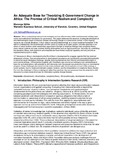An Adequate Base for Theorizing E-government Change in Africa
Abstract
Africa is absorbing new socio-technologies such as eGovernment while simultaneously building basic norms and institutional frameworks for governance. This paper addresses the absence of adequate philosophical and methodological bases to theorize complex technology change in a post-colonial context. In this ongoing research, we evaluate Bhaskar‟s Critical realism and associated writings as a robust analytical framework in the light of contemporary African philosophy and the notion of society as an open system. Societal openness is an axiom of critical realism; some researchers argue that in the light of empirical findings from complexity theory many natural systems are open severely limiting philosophies such as logical positivism. Secondly, by committing the epistemic fallacy, both positivism and interpretivism have limited analytical capability and only provide an impoverished account of reality. ICT discourse in Africa is dominated by the World Bank‟s development for progress agenda that has received widespread criticism. Nascent alternatives to development movements are insufficiently grounded philosophically to mount an equal ideological challenge, despite divorcing themselves from Marxist and essentialist origins in post-colonial writings. Critical realism together with Complexity may provide an ontological and epistemological basis for such alternatives, with potential to shift discourse from the present non-productive focus on instrumental progress. Some challenges discussed include some problems with critical realisms account of the ontology of social systems, how to model and interpret complex contexts, and the interpretation of complexity theory models. For now, the challenge in Africa is ideological rather than practical, the new proposals have the potential to shift discourse to a more productive base for information systems change theories.
Sponsorhip
Warwick Business School, University of WarwickPublisher
School of Business, University of Nairobi

